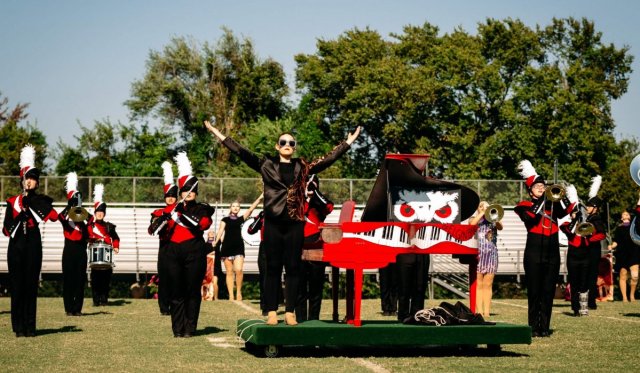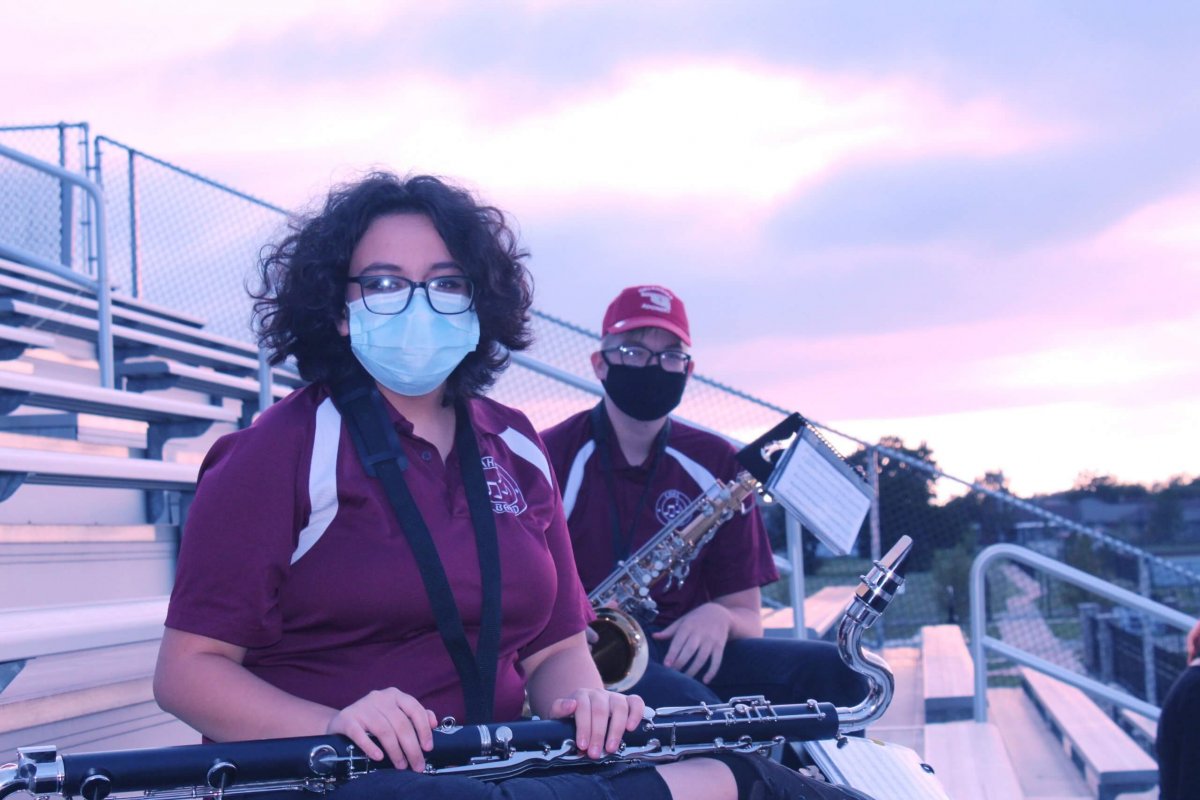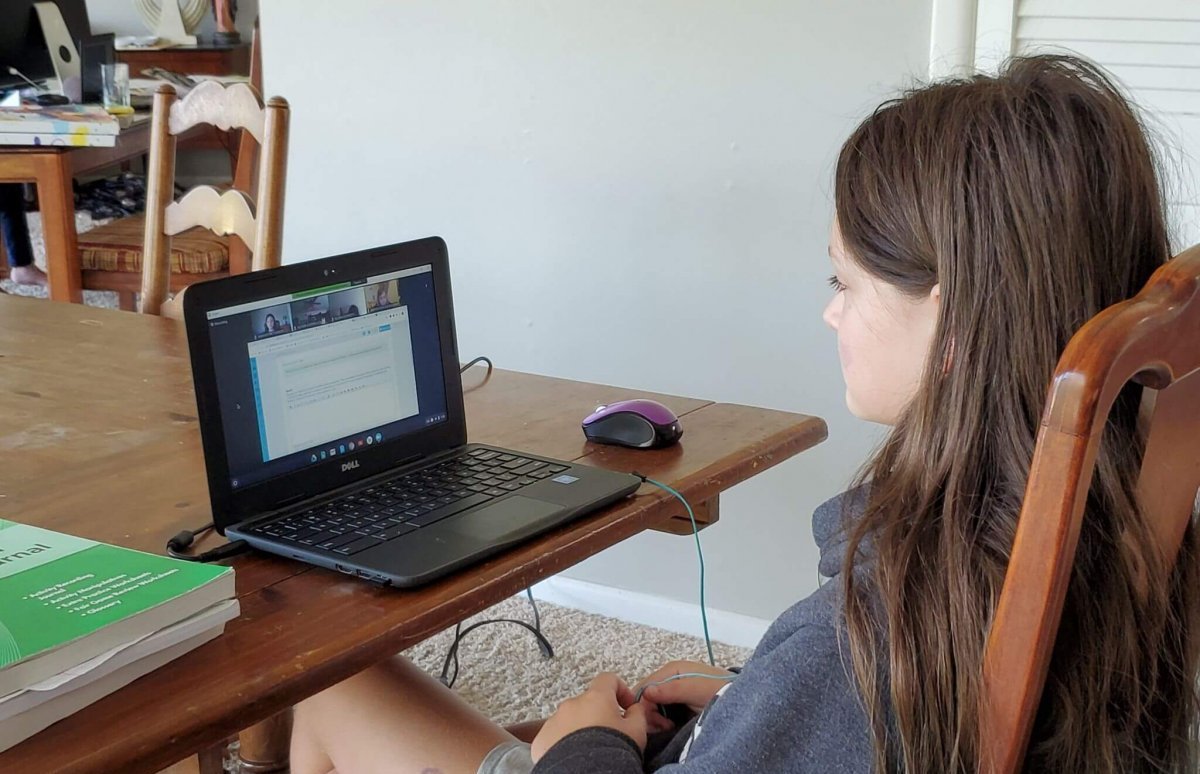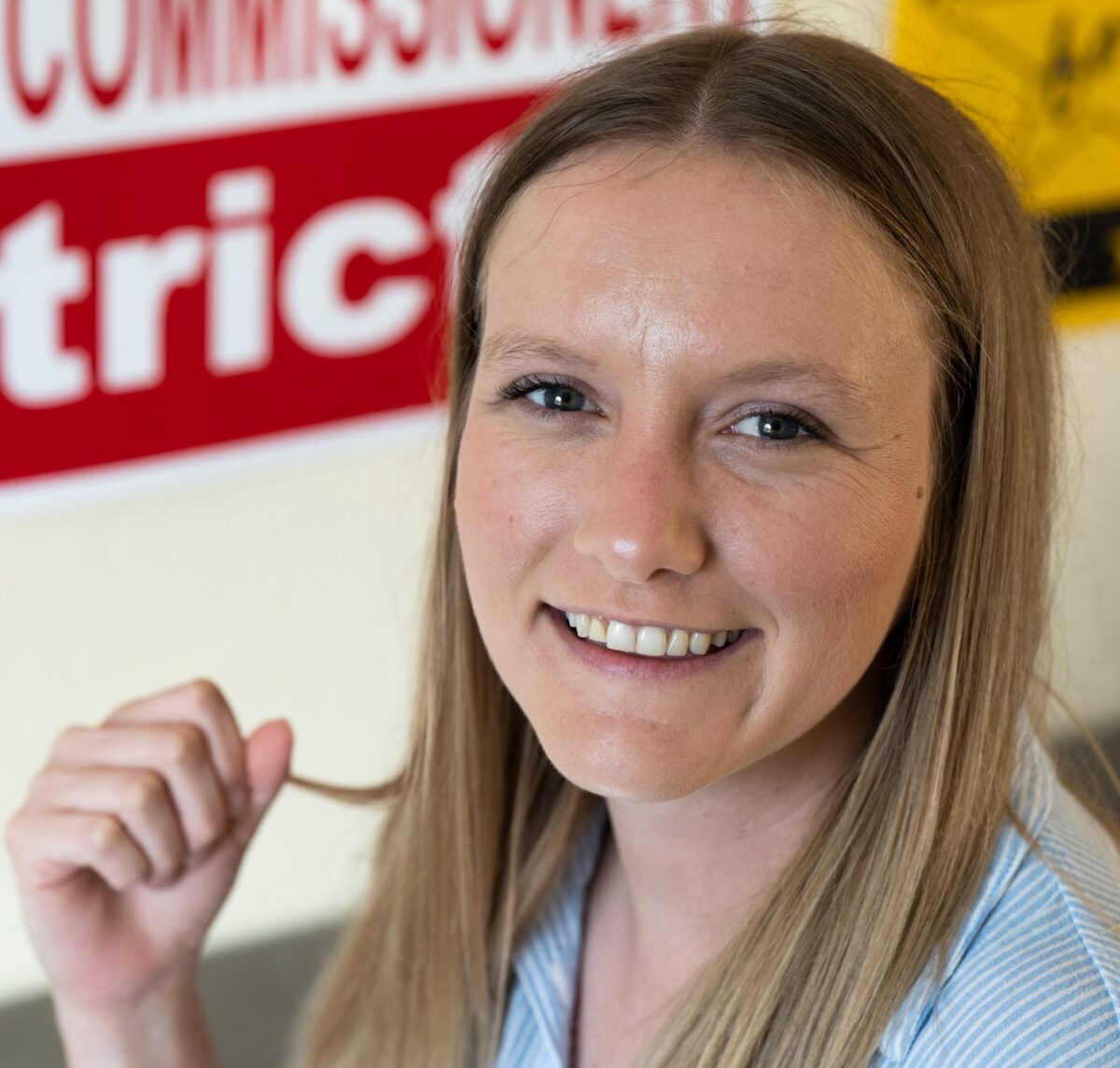

School districts throughout the state have made an array of adjustments to their regular operations owing to COVID-19, and music programs throughout Oklahoma haven’t been an exception.
Director of bands and coordinator for the Academy of Arts at Capitol Hill High School Tristianne Asbury said that after 10 years of teaching, this year has felt like she had to rebuild her music program.
“It’s a big transition especially, in my opinion, for performing arts teachers because other subjects have been utilizing online instruction for years,” she said. “But with band, it’s all right here, in person and together. It was like I had to rebuild and recreate so much.”
While the Capitol Hill band usually meets for a two-week camp during the summer to prepare their football halftime shows in the fall, this year they had to cut practice time down to one week. Rehearsals that were once built into students’ schedules during the traditional school day are now held virtually.
They’ve also had to cut down their mandatory after school full-band rehearsals from four days a week to an optional one day each week. Although the band is used to playing at home and away football games, they’re now limited to only playing at home games, if the game isn’t canceled.

“Our school is currently all virtual, and there’s really not a video conferencing option that allows us to play together,” Asbury said. “Most of what we do during our actual band hour now is focusing on those basics: fundamentals, theory and history. It has made it so that for the halftime show we’re preparing for, I had to be more mindful of the difficulty level of the music I selected because I basically lost five days of rehearsal.”
Asbury found a Harry Potter-themed marching show of moderate difficulty for the band to prepare for their halftime show this year, but even that had to be adjusted to work with practice time constraints and physical limitations the band is now facing.
“It actually has three pieces, but we’re only going to do two of them. They’re used to doing a three-piece show, but this year we’re only doing two, and the marching formations are easier. That way the kids don’t feel like we’re putting something less than great out on the field,” she said. “I didn’t want to cancel completely because I’ve got seniors that have been in band all four years of high school, and I didn’t want them to miss out on the opportunity.”
Some of Capitol Hill’s musicians have already lost musical opportunities this year owing to COVID.
“Right at the beginning of March, we had 42 students qualify for the state level solo and ensemble competition, and they did not get to go,” Asbury said. “That was a huge bummer because it was record breaking how many kids we had qualify.”
Other courses within the Academy of Arts have had to restructure as well. Vocal music classes are now giving out media recording assignments, the dance program is having students practice in front of a camera conducive to virtual learning, and visual arts students are doing their work from home, while some deal with a lack of supplies. Performances for the remainder of the year are also in limbo.
“We schedule winter concerts, we schedule spring concerts, a big Broadway show in March and a talent show in November. All of that stuff has a big question mark next to it right now based on what the district will allow us to do and what we will be comfortable doing while keeping kids as safe as possible,” Asbury said.
Despite these changes to the typical marching band season, Asbury said her students have been trying their best to stay positive.
“They’re definitely bummed, to say the least. They’re a little beat down by it, but I appreciate their spirit. They really are trying to stay positive,” she said. “Especially the seniors, they’re really trying to enjoy the limited things we’re allowed to do. Band is like a second family, so they’ve been willing to do whatever it takes to still be apart of it.”
‘I felt an obligation to the kids’

While some band programs have had major upsets to their marching season owing to COVID-19 and district restrictions, the Elgin High School marching band in southwest Oklahoma has tried to maintain most of their general operations, with precautions in place.
Band director Mike Palmer said he and his staff have been making plans to pull their season off since the spring.
“The idea of aerosols and us breathing in each other’s aerosols wasn’t really even a thought that we had, and when the whole COVID-19 thing happened and we shut down schools, we started to get a lot of coverage over what exactly is happening,” Palmer said. “That kind of got all the wheels to spin in the music world, especially thinking about close proximity and the fact that we’re breathing in the same air at the same time consistently for an hour-long rehearsal.”
In order to help limit the exchange of aerosols while playing with a 105-member marching band, Palmer opted to hold all rehearsals outdoors, beginning with their optional, once a week rehearsals in June.
“When we started to do rehearsals, we said all of our rehearsals are going to be outside until we can make sure that we’re comfortable with being inside and know all of the protocols that we need to take inside,” Palmer said.
Students are set up with more distance between them, they’re told to maintain social distancing guidelines while at rehearsals, and masks are required unless a student is playing their instrument. In August, the band held its usual two-week band camp for students to prepare their Elton John-themed marching show, and they have still been able to hold their usual rehearsals during the school day, as Elgin Public Schools is holding traditional classes, while precautions.
“The kids have adapted really well, and I feel like we have too as a staff. We have to,” Palmer said. “In order for us to keep being in band, it’s just apart of what we have to do.”
While many marching contests in Oklahoma for the 2020 season have been canceled, Elgin’s band will still be able to attend three out of their usual four competitions. They competed on Sept. 26 in Pauls Valley, where they were named “outstanding band of the day” and won first place in the other categories. They will perform at two more contests over the next month, including the OSSAA Southwest Regional competition on Oct. 20.
Palmer said he has seen a lot of posts on Facebook from fellow band directors regarding the altering of marching movements and the music that they pick for their ensembles. However, with the exception of larger spaces between students in the marching drill that he wrote, Palmer said he feels fortunate to have been able to maintain the difficulty level of the band’s show.
“We were pretty fortunate that I didn’t really change anything in my regular process,” Palmer said. “I felt an obligation to the kids to give them as close to a normal experience as possible. Band kids choose to be in your band. It’s not like English, science or math where you have to be in there. When they make that choice, I hold that fairly sacred. My responsibility is to give them that experience they’re choosing to get, and part of that is to choose a show we would normally do and to try to do drills we would normally do.”
They were also able to pull off the marching contest they host, the Elgin Owls Southwest Showdown, although it was more of an isolated experience than marching contests in the past.
“We spent hours working on the details. We felt that we could keep everyone safe by extending the times of everything,” Palmer said. “We knew it would make the day move a little slower and that we would have a lot of down time, but we thought that’s OK as long as it means we can still have contests and keep everyone safe.”
Rather than having all the competing bands arrive in the morning and stay throughout the day to warm-up and perform, bands were told to arrive at a specific time and were contained in a certain parking lot for unloading instruments, putting on uniforms and warming up. Bands were also given certain paths to take to the field to perform that didn’t intersect with any other bands, along with 20 to 40 minutes between each performance.
“The first band arrived at 9 a.m., and we finished at about 9 p.m. that night. It was slow. We only saw 13 bands, but it worked.” Palmer said. “In normal years, everyone parks in the same big lot, and there are kids from every school able to hang out with each other, which is a big, fun part of being in band. So that part is something that we missed.”
Despite some of the social aspects of marching band being hindered, Palmer said his students have had a great attitude.
“They know how fortunate we are right now to be here, so they’ve taken this, ‘Let’s do it well while we can’ attitude,” Palmer said. “It’s been fun to see the resilience of these kids. They have the right attitude. They’re coming everyday saying to themselves, ‘While we can, let’s do it right, and let’s do it well.’ We adults need to learn some things from kids from time to time.”
‘They’re musicians. They want to share, it’s in their nature’

Walking the halls of El Sistema Oklahoma at First Presbyterian Church, one is generally greeted with the swelling sounds of strings and the upbeat and methodical ring of percussion. However, this year has been different for the after-school music program that serves Oklahoma City Public Schools students.
In past years, the program used to see 230 musicians attend their free music classes in-person five days a week. Owing to COVID-19, however, about 60 percent of the students now attend in-person classes split up so that each student is on site just one day a week. This allows for no more than three or four students in a classroom at a time with the rest of the students attending music classes virtually.
“Our goal is to promote joy and hope through music,” El Sistema Oklahoma executive director Kim Wilson said. “Our program is very community-based with a lot of social interaction, so we had to rethink that whole structure.”
The program generally has five orchestras ranging from elementary school beginners to more experienced high schoolers, as well as a modern band option. But the program has had to take a hiatus from group ensembles owing to physical restrictions. The in-person classes now focus on composition, fundamentals and small-group instrumental instruction, while the online instruction provides individual lessons.
A music teacher at Northwest Classen High School, Samantha Sy serves as the El Sistema Esperanza Orchestra conductor and coordinator of instrumental teacher support. She said the technology used for virtual lessons and meetings can be ineffective for music education
“For so long, I feel like technology was surpassing us, and now we’re at a point where we need technology and it’s not meeting our needs, particularly in the musical world,” Sy said. “I would love for all of my kids to be off mute, but because of the technology, it creates the feedback and static. I think virtually, it’s just harder to engage your kids.”
Sy is also concerned about the effect that not playing in an ensemble for so long might have on students.
RELATED
‘I’m overwhelmed’: Single parents navigate virtual learning by Megan Prather
“I think there will be a lot of unlearning to be done,” she said. “So much relationship building happens in the ensemble, and I’m afraid that piece will have diminished a little bit.”
El Sistema’s director of musicianship and logistics, Lori Garner, said some students are also struggling with how much time they have to spend behind a screen during their normal school hours and the lack of ability to share ideas freely that it presents.
“I call them the ‘muted students’ because they’re unmuted only when the teacher wants them to be unmuted during most of their classes,” Garner said. “They can’t just speak out freely. That’s at least what I’m hearing from the students, that they’re struggling with that because that’s not the type of people that they are. They’re musicians. They want to share, it’s in their nature.”
Overall, the opportunity for students to share their music with others, whether online or in-person, has remained a highlight to these musicians.
“Our kids were so eager to come back,” Wilson said.” You can tell how much they’re needing that connection.”






















